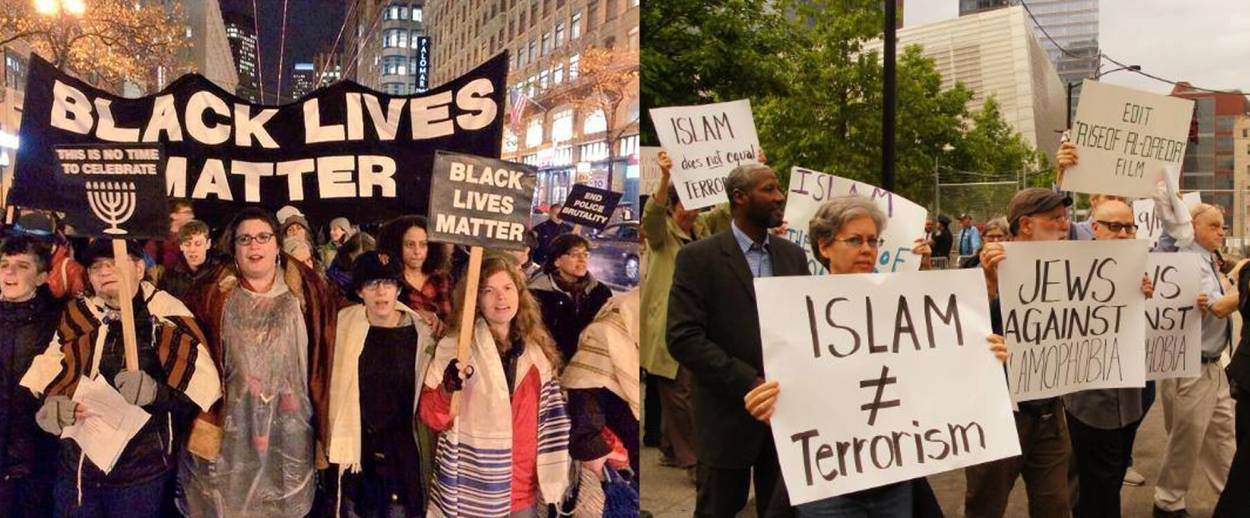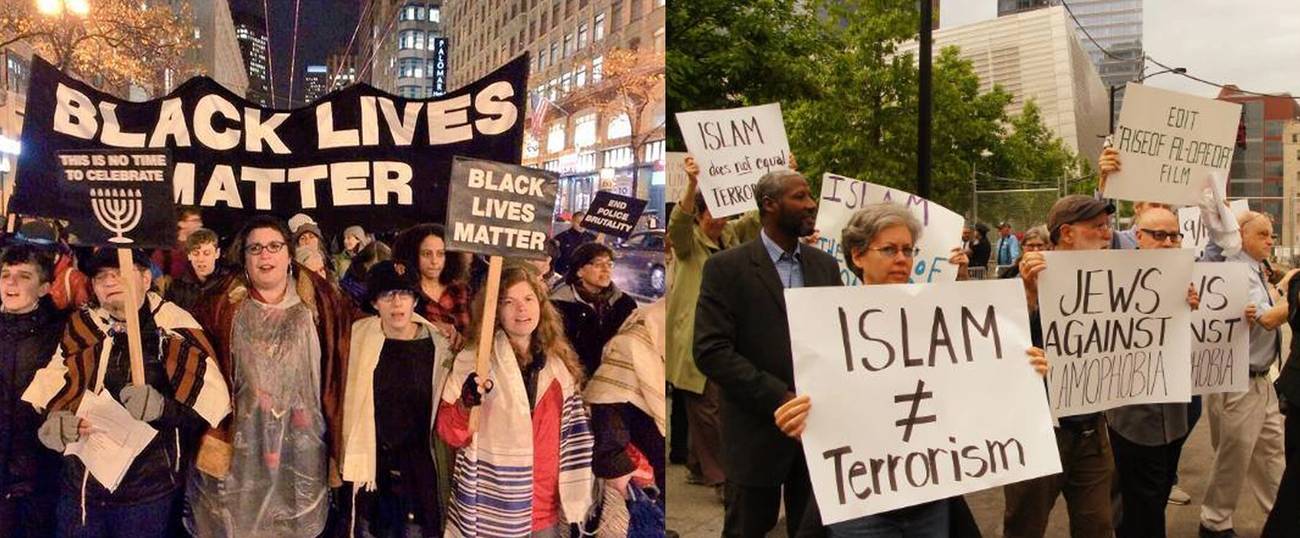Dear Social Justice Warriors: Your Religion Is Progressivism, Not Judaism
It’s time to stop pretending our politics and our theology are one and the same




As a Jew, I practice Judaism.
Is that a dim-witted statement? I apologize; it’s just that so many of our brothers and sisters these days make a point of telling me that, as a Jew, I ought to do this or that or the other thing. As Jews, thunder the young activists, we should embrace the Black Lives Matter platform even as it singles out the Jewish State, alone among the world’s nations, for calumny and outrageously accuses it of genocide. As Jews, lectures the doctoral candidate, we should reject Israel’s occupation of Palestinian lands, the single engine driving our people to the brink of disaster. And to hear the columnist tell it, we should even, as Jews, rise against the French ban on “burkinis,” the full-bodied wetsuit some Muslim women choose to wear for modesty’s sake while bathing at the beach. These are all stirring causes worthy of consideration. They have, however, absolutely nothing to do with the fundamentals of our faith.
We’ve spent quite a bit of time in recent years debating who’s a Jew, but we’ve neglected to ask the thornier question: namely, what is Judaism? It’s a question that belongs with theologians, a scholastic class that, in our tradition, is sadly more likely to focus on offering a close reading of some sacred scrap of text than on addressing the fundamental relations between the tenets of faith and the earthly soil in which they’re rooted. It’s a shame—we need this sort of inquiry more than ever now that every social-justice warrior fashions our creed into a banner under which to march into battle.
For inspiration, then, we ought to look to our Christian brothers. In 1923, American Christendom received a master class in doctrinal clarity when a perfervid Presbyterian named John Gresham Machen wrote a short book titled Christianity and Liberalism. Too many of his contemporary faithful, he argued, have come to look at their religion as a blank screen on which to project the values of progressive liberalism. They’ve come to see Christ as a metaphor, not a deity, a gentle reminder to always be good and kind because kindness and goodness were just, you know, right. They read the Bible for affirmation, not for instruction, and they were always ready to ignore its teachings if those clashed, however mildly, with modernity’s latest edicts. Liberals who could not abide by Christianity’s essential truths, Machen argued, were many wonderful things, but they were not Christians. And everyone, the fiery theologian concluded, would be better for it if they stopped pretending that their values corresponded in any but a tangential way with those of the core Christian faith.
You can imagine how well Machen and his ideas were received. Rejected and dejected, Machen quit his perch at Princeton and was soon thereafter altogether defrocked of the ministry for his refusal to compromise his beliefs. He traveled extensively to minister to the few who still supported him, and died on one of those journeys, on New Year’s Day of 1937, in Bismarck, North Dakota. He was 55. On his grave was inscribed, in Greek, the motto that captured him best: “Faithful Unto Death.” In a warm obituary several weeks later, H.L. Mencken advised his readers that the deceased “fell out with the reformers who have been trying, in late years, to convert the Presbyterian Church into a kind of literary and social club, devoted vaguely to good works.”
What fun Machen would have had, then, had he stuck around long enough to witness Judaism today and see it turned, by and large, into just such an enfeebled club. Had he walked into our shuls or read our publications, he would’ve despaired to hear so many of us speak reverentially of Tikkun Olam, the commandment to repair the world, as if it alone stood at the core of our ancient faith, or as if world-repairing, stripped of its specific theological underpinnings, were anything more than the vague sort of general goodwill professed not only by Jews but also by Hindus, Zoroastrians, members of the Kiwanis Club, and practically every other sentient being who ever gazed upon God’s creation and had the fleeting feeling that it ought to be just a touch more perfect. Saying you crave social justice doesn’t make you any more Jewish than saying you crave pizza makes you Italian; it’s a mood, not a belief system, and that so many of us are so frequently unable to tell the difference is dispiriting.
How did we get here? It is, as you might’ve guessed, a complicated question. In part, it has to do with the fluidity of the terms we use when we talk about being Jewish. Ours, we agree, is not only a religion but also an ethnicity, a confluence that can confuse us into assuming Judaism is big enough for whatever multitude we wish it to contain. It’s not. As inviting as our tradition of dissent and divergent interpretations is, at its core, it is impossible to divorce from the concrete theological foundations on which it rests. Like divine election, for example: Whether you consider the Jews followers of a faith, members of a nation, or both, you can hardly ignore the historical and doctrinal truth that they became whatever they may now be one day long ago at the foothills of a mountain far away, when they accepted the strange burden of becoming God’s chosen children. Considered from a modern, cosmopolitan perspective, it’s an inconvenient truth, which is why you likely won’t hear it discussed very often in op-eds or sermons. Wrestling with the bond that ties us to the Creator is hard; preaching some gauzy nicety about embracing the Other is not.
Don’t get me wrong: I take no inherent issue with progressive values, nor do I believe that they’ve positively no place in Judaism. But progressive values—or conservative convictions, or libertarian streaks, or any other variety of ideological sentiments—have no place in religion unless they spring, exclusively and clearly and forcefully, from theology. Otherwise, the City of God and the City of Man become one and the same: a dull and loud place in which no spirit can ever soar.
It’s time we ended this farce. Those of us who find little use for Judaism except as a stage on which to perform the pageantry of progressivism should kindly take a bow and leave for other precincts that better suit their interests. They do the rest of us no favors by sticking around and insisting that we contort our beliefs to mean nothing more than whatever political agenda happens to be fashionable at the moment. The rest of us, those still interested in being Jews, will do what those still interested in being Jews have done for millennia: We’ll continue to find new and meaningful ways to grapple with the questions of our faith. Our answers will be diverse. Some of us will emerge with a thirst for reform; others, with insights into old traditions. Some will find joy in Orthodoxy; others, meaning in the Renewal movement. But all of us who remain should take three vows: to engage with Judaism on its terms, not our own; to refrain from arguing that this engagement somehow gives us the authority to make claims on anything but the faith itself; and to have the intellectual and moral decency to realize that while political and theological questions sometimes converge, they are never, at their essence, the same questions. As Jews, there’s really nothing else we ought to do.
***
Like this article? Sign up for our Daily Digest to get Tablet Magazine’s new content in your inbox each morning.
Liel Leibovitz is editor-at-large for Tablet Magazine and a host of its weekly culture podcast Unorthodox and daily Talmud podcast Take One. He is the editor of Zionism: The Tablet Guide.